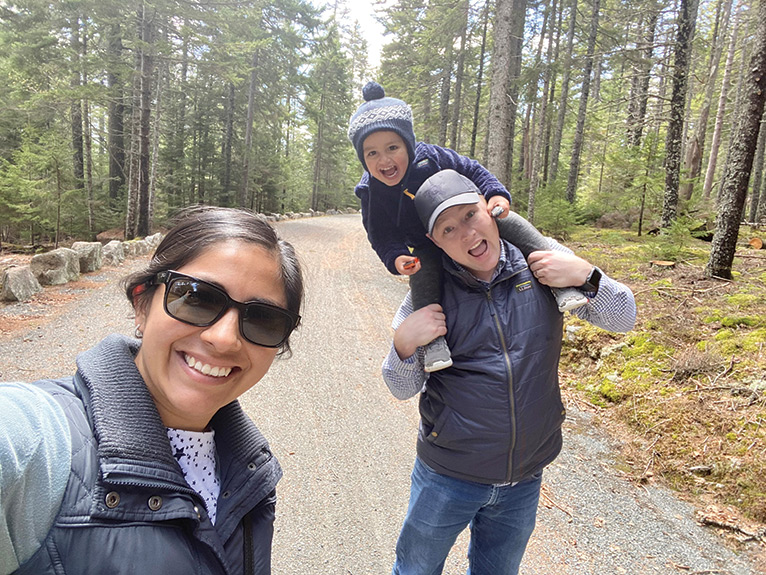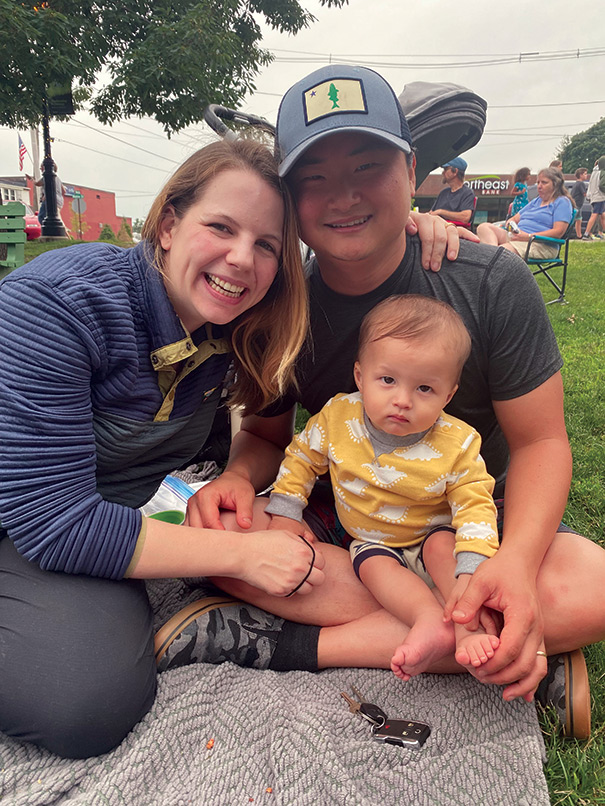Mainers Wanted

Nonprofit Live + Work in Maine helps locals and wannabe Mainers find job opportunities in Vacationland.
As director of constituent outreach and legislative affairs in the Pennsylvania state legislature, Galen Weibley loved working in public service. But he did not love his long commute on congested roads, which meant he only had time to go fishing on weekends. All that changed in 2019, when Weibley got a job as the director of economic and community development for the city of Presque Isle, in Aroostook County. He’s pursuing his professional goals, but he works closer to home, so he doesn’t feel like he has to choose between making a living and having a life. “After work, I can go get my dog and my tackle and be out on the water in 30 minutes,” he says.
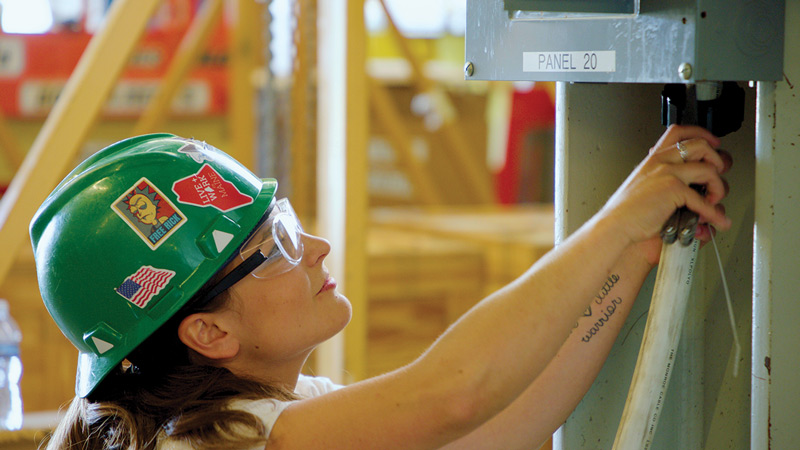
An increasing number of people like Weibley are discovering that Maine is more than just a great place to take a vacation — it’s an ideal place to build a business, advance a career, raise a family, and find the kind of work-life balance that is hard to come by in many other locales. Thousands of people have relocated to Maine over the past five years, thanks in part to Live + Work in Maine, a statewide initiative that helps Maine employers connect with job seekers and spreads the message about local professional opportunities.

“We often attract people who enjoy the outdoors. They see a lot more opportunity to do that here than they do in New York City,” MaineHealth vice president of talent Helene Kennedy says. What’s more, she adds, in Maine, newcomers discover more opportunities for connection than they could in big cities and sprawling suburbs. “There is something about the community feeling people experience in Maine. We know we’re all going to take care of each other.”
Consider Eric and Liz Smith, who moved to Phippsburg from the Philadelphia suburbs in 2017. Eric’s family had vacationed near Ellsworth when he was a kid, and Liz, who grew up in the Boston suburbs, had spent time in Blue Hill. When they started looking for a place where they could have a more outdoorsy lifestyle with a slower pace, Maine was a natural choice — especially once Eric landed an IT job at L.L.Bean (Liz was already working remotely). In just four years, they’ve had a baby, moved to Brunswick, switched jobs, and discovered a community of people who treasure time in nature as much as they do.
“We walk, we bike on the town commons, we meet up with friends from our son’s daycare on trails that are just 10 minutes away,” Liz says. Adds Eric, “It’s certainly something we don’t take for granted.”
Share your story of how you came to Maine, and engage with other Mainers, on Live + Work in Maine’s Instagram, LinkedIn, or Facebook.
Earth Days

theecologyschool.org
The Ecology School provides nature-based experiences that nurture love for the outdoors, turning participants into lifelong stewards.
Photos courtesy of the Ecology School
When Nate Colpitts learned that The Ecology School was offering a weeklong Eco-Adventure day camp last summer, he was eager to send his eight-year-old son, Calvin. “It’s so important that my son develops a love for the outdoors and a desire to care for the environment,” the Saco resident says. Taking care of the environment is “the number-one issue his generation and ours will face.”
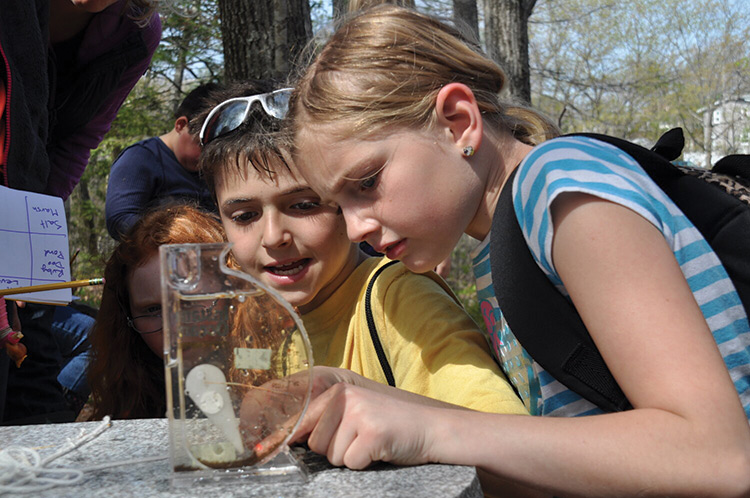
When Calvin returned from camp and informed his dad that “all creatures deserve to live the course of their lives naturally, from the smallest insect to the largest mammal,” Nate considered his mission accomplished. “They’re bringing energy to such important topics,” Nate says.
Summer 2022 marks the first season The Ecology School will transition its day-camp program — which usually fills up within a few weeks of opening registration — to a full overnight camp. The magic of nature that kids experience each summer will be unique and transformative, breaking down big topics like sustainability, climate change, and farming into entertaining, educational activities that kids can enjoy at camp and take action on at home.

Campers will have 105 acres of forests, farm fields, ponds, and more to explore at The Ecology School’s new River Bend Farm campus, located on the Saco River. The campus has two new buildings, models of sustainability that are built to meet the world’s most rigorous green building standards. Solar panels on-site generate energy. Rain gardens capture stormwater runoff so it can be reused to water the gardens and fields. A five-acre farm grows vegetables that are used in campers’ daily meals.
“We’re giving kids an opportunity to come here and acquire the tools to understand adult topics like climate change, but also have fun and really engage in learning about the world so they understand their place in it and the role they can play to help protect it,” director of programs Alex Grindle says.
Much of the benefit campers get, she adds, comes from getting away from screens and their everyday environments and exploring The Ecology School grounds — romping through the meadows, marveling at the snails and the slugs on the riverbank, and spending time in the forest.
“Kids have a natural desire to be connected to the world around them — it’s embedded in all of us,” Grindle says. “It’s really powerful to see those connections really flourish here.”
In addition to camps, The Ecology School has a robust overnight program for schools, professional development for teachers, agricultural workshops for adults, and now, with the opening of River Bend Farm, a rentable space for groups inspired to experience true sustainable living. Since the organization opened in 1998, it has hosted 187,000 kids and adults from all over the country to learn about sustainability, conservation, and connections between people, plants, and animals.
Coast Guards

islandinstitute.org
The Island Institute helps Maine’s coastal and island communities build a sustainable future.
Photos by Jack Sullivan
In the tiny midcoast town of Bremen, the working waterfront is the beating heart of the community. On an inlet where the Medomak River meets Muscongus Bay, the Bremen Lobster Pound Co-Op has operated for nearly a century, a base for local fishermen and a cultural touchstone for the town’s 800 residents.
But five years ago, the future of the working waterfront was uncertain; its aging infrastructure was in need of an upgrade, and many longtime co-op members wanted to retire. With skyrocketing real-estate values and looming questions about what impact regulations and warming waters would have on lobstering, many worried that the waterfront would be converted to a different use and that Bremen would lose its treasured center of gravity.
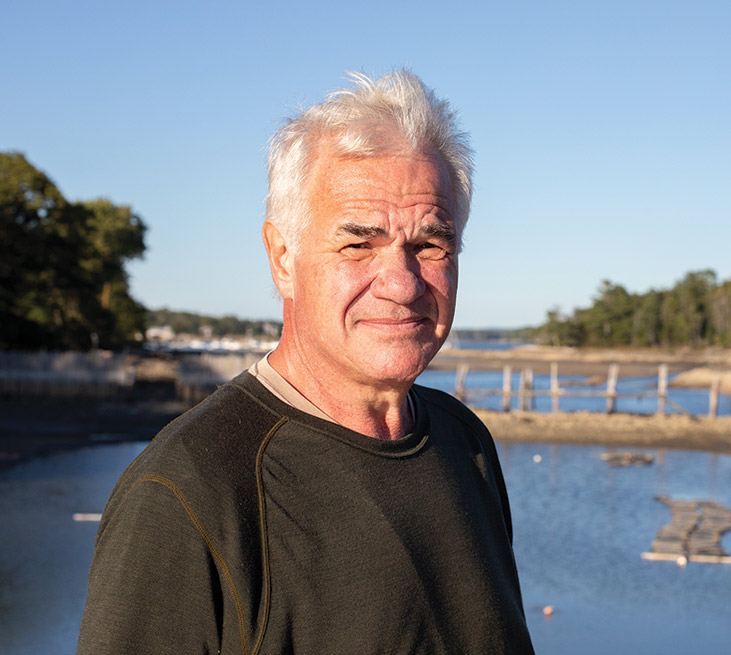
“If the working waterfront were to go away, jobs would go away for people whose families have been making a living on the water for generations,” says town selectman Boe Marsh, who has operated a lobster, clam, and shrimp dealership in Bremen since 2010. “A big part of the spirit of the community would be lost.”
Marsh’s company, Community Shellfish, bought the Bremen Lobster Pound Co-Op in 2017 and added new holding tanks, bait storage, and other essential infrastructure for lobster harvesting and processing. In two former lobster pounds, he set up aquaculture for oysters and clams. Today, Community Shellfish employs 27 people and buys lobster from 35 fishermen, as well as clams from 100 harvesters. A number of local lobstermen have started cultivating oysters, seaweed, and kelp to augment their fishing incomes.
To launch the aquaculture operations, Marsh got a vital assist from the Island Institute. The Rockland-based community-development nonprofit consulted with Marsh, helping him identify and apply for grants, tap into other financing opportunities, and connect with researchers at the University of Maine.
“The Island Institute was a true partner,” Marsh says. “They helped me not just preserve the waterfront but dynamize it.”
The assistance is just one of the myriad ways that the Island Institute works with residents in coastal and year-round island communities to tackle economic challenges. The Institute trained and continues to support dozens of fishermen in kelp and shellfish farming. In addition, the organization offers professional development, targeted investment, and networking to help small businesses along the coast. Its longstanding Island Fellows program also builds critical capacity in small towns for community-based projects in education, government, and health care.

To hear Island Institute senior community development officer Sam Belknap tell it, the nonprofit’s work to fortify working waterfronts has never been more important. “Working waterfronts represent this critical intersection between the ocean and the economy, and they’re incredibly vulnerable,” he says. “It’s not just about preserving jobs or the operations on the shoreline, it’s about ensuring that these coastal communities and their economies are as resilient as possible to all the changes we’re seeing all along the coast.”
Striking a Chord

317raisethebarn.org
317 Main Community Music Center builds connections through song.
Photos courtesy of 317 Main Community Music Center
After Barbara Atherton moved to West Bath from the DC area in 2011, she quickly became a regular at open-mic nights at 317 Main Community Music Center, in Yarmouth. “She kept coming home and saying, ‘You’ve got to see this place — it’s just alive with people,’” her husband, Jim, recalls.
Before long, both Athertons were students at 317 Main. Barbara, who played the fiddle, started mandolin lessons, and Jim, who played electric bass, began learning the upright bass. They both joined Unspent Youth, an ensemble of retirees who meet weekly with a 317 teaching artist and who perform on a regular basis. “If you love music, you have to go for it,” Barbara says. “The instructors are good at meeting you where you are and going from there.”
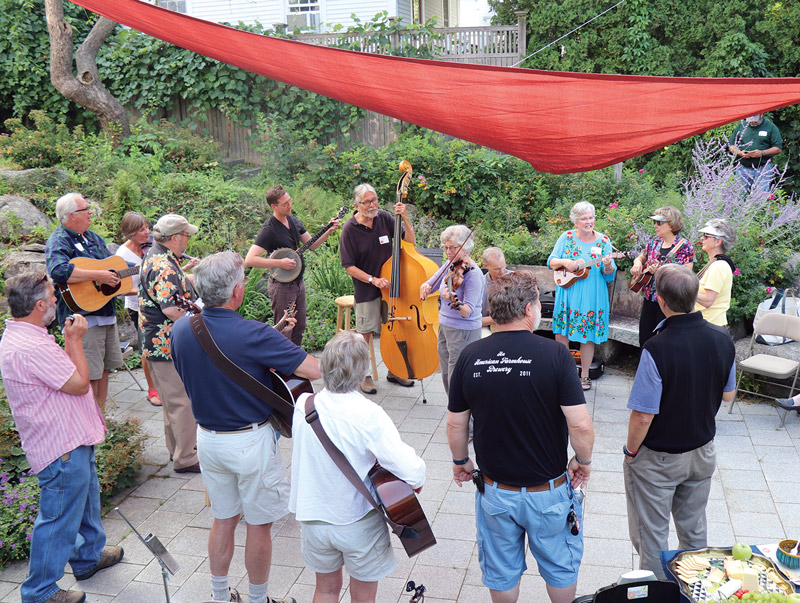
The Athertons are two of more than 25,000 people, ranging from toddlers to octogenarians, who’ve taken lessons, joined ensembles, attended summer camps, festivals, concerts, and jam sessions at 317 Main, many of them traveling as far as 50 miles to do so. Through its grant-funded community partnership programs, the nonprofit also works with schools, senior centers, and other community organizations to offer free music lessons, performances, and workshops to people who wouldn’t otherwise have access.
Demand for 317’s programs has grown exponentially since its founding in 2004 and only accelerated during the pandemic as 317 has expanded remote offerings. Now more than ever, people are hungering for music, with its power to comfort, nurture, connect, and build community, 317 Main executive director John Williams says.

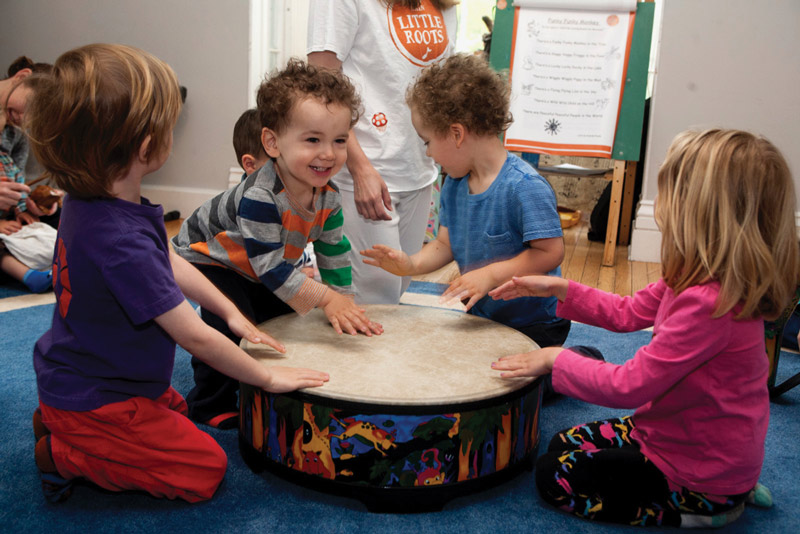
“Music is the catalyst — and we offer quality music programming that is geared to meet each individual where they are in their musical journey,” Williams says. “But the idea is really to create a fun, stress-free, engaging environment.”
317 Main is now working to raise $4 million to renovate and expand its facility, a restored 1855 Italianate home on Yarmouth’s Main Street, to meet growing demand and facilitate future growth. Their Raise the Barn campaign will fund a recording studio and music lab, 11 new soundproof lesson rooms, a 200-seat multipurpose performance space, and other community spaces to encourage connection. That’s music to the ears of folks like professional pianist David Bartoletti, whose five-year-old daughter, Maddelina, participated in one of 317’s weeklong summer camps. She loved it so much that they enrolled in a Little Roots class, which introduces young kids to ukulele, fiddle, and piano during a 13-week session. “Camp was a really great stepping stone — to be in an easy, fun, happy environment and practice making friends,” Bartoletti, of New Gloucester, says. “317 is a community where so many different wonderful things can happen.”
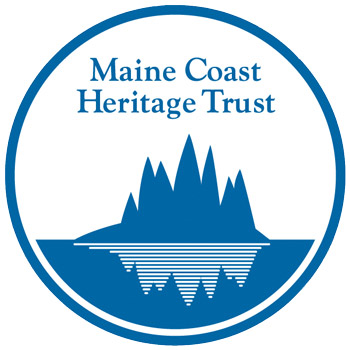
mcht.org
Island Rescue
With help from Maine Beer Company, Maine Coast Heritage Trust is working to preserve a treasured getaway in Casco Bay.
Since Ryan Conery-Poulin moved to Maine nearly a decade ago, Little Whaleboat Island has provided a natural escape for him and his family. Conery-Poulin has spent many a summer afternoon with his wife and three kids out on the island, probing tide pools, clambering up rocky ledges, exploring the forest of century-old oaks, and savoring the sensation of being on a remote island, despite it being just five miles from the Freeport town dock. He treasures the memories they’ve made watching bald-eagle fledglings learn to fly, walking across the sandbars to Tuck and Nate islands at low tide, and discovering the fragrant sea lavender that grows in the island’s meadow.

“There’s always a sense of discovery and adventure whenever we go to Little Whaleboat,” says Conery-Poulin, who is head of tasting-room operations for Maine Beer Company, in Freeport. On Little Whaleboat Island, “We’re able to leave the world behind, de-stress, and just enjoy spending time together. We’re so grateful to have places like this.”
For decades, families like the Conery-Poulins have been able to enjoy Little Whaleboat because its owner has welcomed the public to come ashore. Now, the owner is ready to sell, and Maine Coast Heritage Trust is working to raise $1.3 million to buy the 22-acre island and ensure that it remains undeveloped and open to the public forever. The work is part of MCHT’s sweeping effort to protect Maine’s coast. Already, the land trust has conserved 156,000 acres of coastal land from Kittery to Lubec and created 148 preserves free and open to the public.
For MCHT, the Little Whaleboat Project represents a rare opportunity to secure a wild place in the heart of southern Maine, which is the most populated and developed part of the state. As Casco Bay’s popularity increases, project manager Keith Fletcher says, it’s important to protect unspoiled natural places where people can find solitude and to ensure that animals, plants, and nesting birds, as well as the waters and marine ecosystems, will be protected from development. “Privately owned islands rarely go up for sale,” Fletcher says, “So whenever there is an opportunity to protect an island that provides scenic, recreational, and ecological value, it’s important that we take it.”
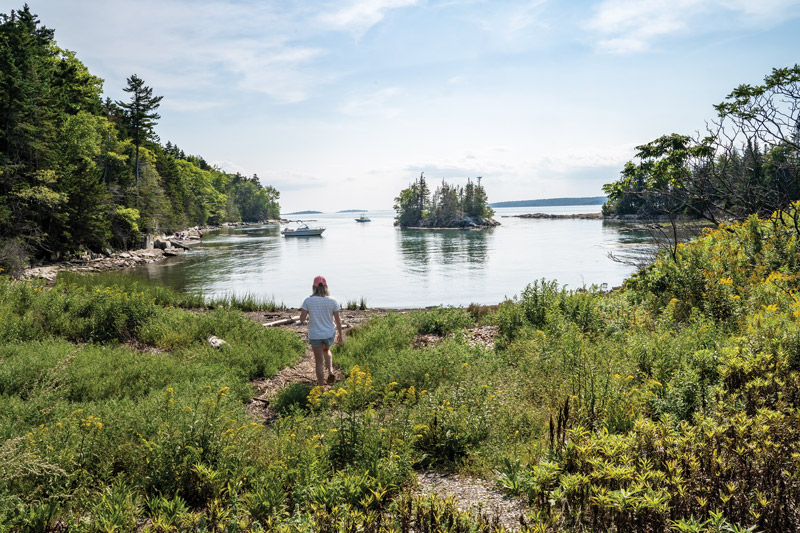
MCHT got a big lift in conserving Little Whaleboat from Maine Beer Company, which donated $50,000 to the campaign earlier this year. “These islands are real treasures,” Maine Beer Company co-owner Daniel Kleban says. “It’s easy to forget how fortunate we are in Maine to have places like this that are just so close to shore and yet feel totally remote and so peaceful. It takes effort from organizations and people who are in a position to help to conserve places like this.”
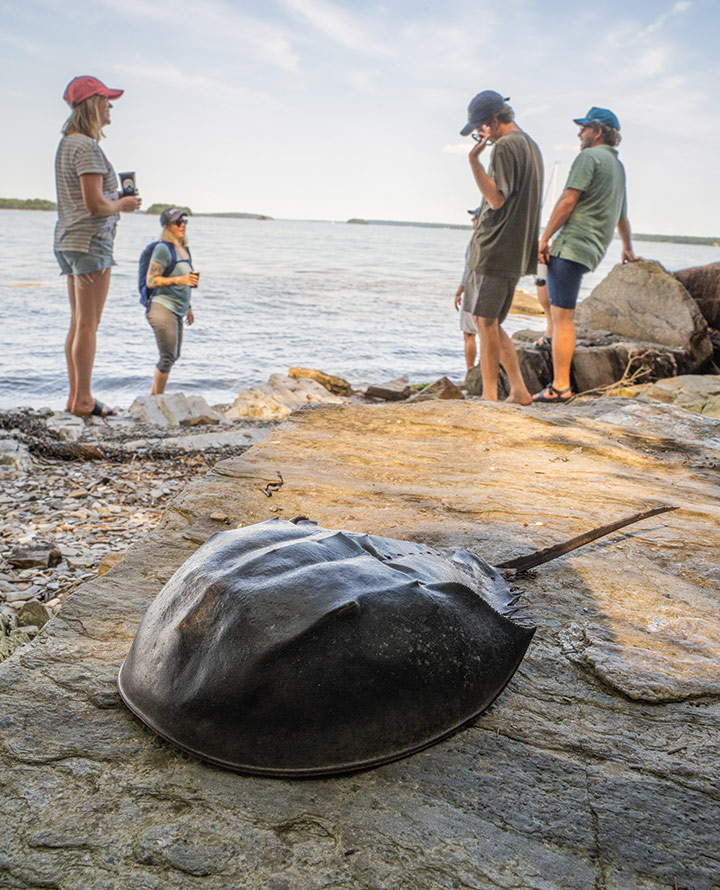
The support for Little Whaleboat is just one of a multitude of social-responsibility initiatives that Kleban and his brother David have rolled out since they launched Maine Beer Company in 2009. The company installed solar panels on its Freeport campus, which offset more than half the energy the brewery and tasting room use. By 2030, the company wants to generate enough renewable energy to offset every watt of electricity it consumes. As a member of 1% for the Planet, Maine Beer donates 1 percent of its gross annual sales to environmental causes.
Maine Beer Company’s support for the Little Whaleboat project is about more than just helping MCHT reach the fundraising target, Kleban says. He hopes to raise awareness about MCHT’s work and to inspire Maine Beer Company fans to make a similar commitment to causes they are passionate about, giving what they are able to, whether that’s volunteer time or financial support.
“We want to lead by example and show that you don’t have to be the richest person or the biggest company in the world in order to make the world a better place,” Kleban says. “A bunch of people doing really small things can add up and have a huge and lasting impact. By using this megaphone that we have, our hope is that we’ll show others what’s possible.”
World Class

kentshill.org
At Kents Hill School, high-schoolers get an education that serves them far beyond the classroom walls.
When asked to describe what makes the Kents Hill School experience unique, Jackson Melendy thinks about the multicultural-literature class he took during his junior year. He read books like A Long Way Gone: Memoirs of a Boy Soldier and had in-depth discussions about issues like civil war, migration, and poverty, examining how the story relates to events happening around the world right now.

“Class wasn’t just about reading books, learning grammar, and memorizing information,” says Melendy, a senior. “It was about using the texts to learn about the world and understand it better.”
Whenever Melendy didn’t understand something, he always felt like he could reach out for guidance. With classes that have as few as four students, “it’s easy to really connect with your teachers,” he says. “They’re very open to taking the time to provide whatever help you need.”
Melendy’s experience reflects a large part of what Kents Hill School, located in Readfield, Maine, is trying to do for its 200 day and boarding students in grades nine through 12 and for those taking a postgraduate year. Teachers work to foster critical thinking, creativity, collaboration, and communication in the classroom and beyond, which will serve students long after they graduate.
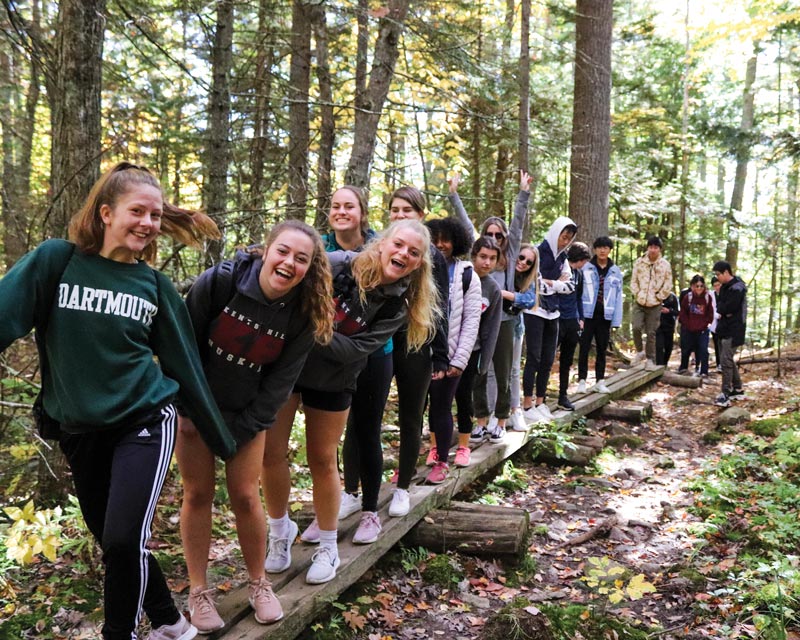
“We need to prepare our students to do more than take tests,” head of school Chris Cheney says. “We’re providing an all-around education for young people that prepares them for anything.”
That all-around ethos informs Kents Hill’s approach to everything from its activity requirements (students must play a sport or participate in an extracurricular activity each season) to its class offerings. In addition to standard courses like chemistry and algebra, students can choose to explore astrophysics, furniture making, global public health, and the social and political history of hip-hop. All classes include projects that give students a chance to apply their knowledge in practical ways.
Students in last year’s Community Design and Build class, for example, built an 18-part story walk for the Readfield Community Library. Over the course of a semester, they worked in teams, developed prototypes, and did all the construction themselves.

“It was a real-world experience, building, collaborating, and doing community service,” Cheney says. “We try to find opportunities for kids to solve bigger problems in tangible ways.”
Equally important, says Dean of Enrollment Management and Director of Financial Aid Alison Lincoln-Rich, is providing students with a sense of belonging and a community on campus that brings socioeconomic diversity that reflects the actual world. Kents Hill students hailfrom 26 countries and 19 states, and more than half of these students receive financial aid.
200
students attend Kents Hill
55%
of students receive financial aid
30%
of students are
from Maine
19
states are represented in the student body
26
countries are represented in the student body
“In high school, students are developing their own sense of self, and we work hard to help them embrace who they are and what is important to them,” Lincoln-Rich says.
That feeling of belonging is a huge part of what senior Naeema O’Rourke has valued about her experience at Kents Hill. As the only person of color at the elementary and middle school in her hometown of Wayne, Maine, she often felt like she was distancing herself from her Indonesian heritage, and she was hesitant to disclose her Muslim faith. But at Kents Hill, where she has friends from Japan, Sweden, China, and Spain, among other places, she feels free to be herself.
“It’s so refreshing to have this little world of diverse cultures in Maine,” O’Rourke says.

She also appreciates the opportunity to build skills and pursue interests that she’ll draw on in the years ahead. A class on Western civilization stoked her interest in world history and has inspired her interest in a career in international relations. She has always loved to ski, but at Kents Hill she gets the opportunity to play soccer and tennis and has learned how much she enjoys those sports too. After serving as student-council president and a tour guide for prospective students, she has gained confidence in a leadership role and in speaking in front of large groups of people.
“Here at Kents Hill,” she says, “I’ve gotten a real opportunity to see what I can do.”
A Campaign to End Hunger

gsfb.org
Good Shepherd Food Bank delivers lasting nourishment to Mainers in need.
For decades, Maine has experienced higher rates of food insecurity than most other states in the nation. Before the pandemic hit, one in five Mainers did not have consistent access to enough nutritious food for an active, healthy life. When COVID-19 swept the globe in 2020 and thousands of jobs disappeared, the hunger crisis escalated. In addition to the families experiencing hunger before the pandemic, some families found themselves on the verge of financial instability for the first time due to COVID-19 and began turning to community food pantries to support their basic needs.
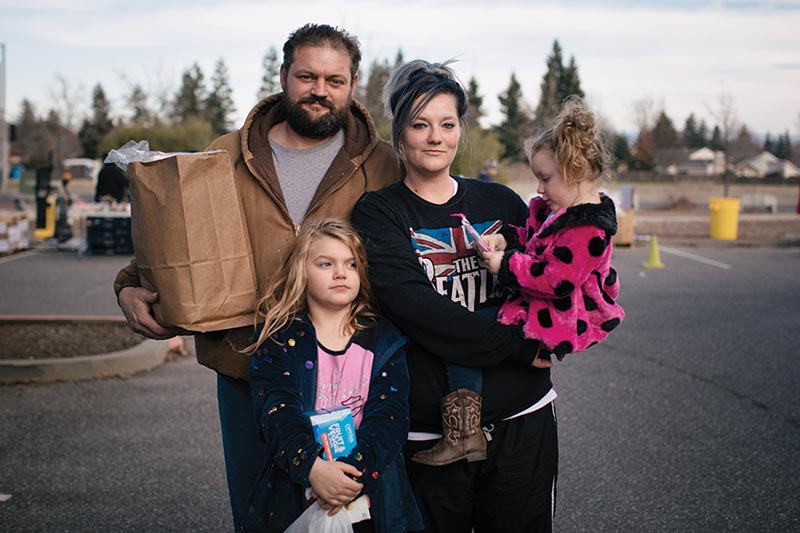
Staff and volunteers at Maine’s Good Shepherd Food Bank saw the effects firsthand. “During the pandemic, hunger was touching more lives, and it became more visible,” vice president of development and communications Erin Fogg says.
As the recovery from COVID-19 continues, an estimated 40 million meals will be needed in Maine in the coming year. Good Shepherd Food Bank, Maine’s largest hunger-relief organization, is working to meet that need through its Campaign to End Hunger, a sweeping effort to raise $250 million in large-scale food donations and philanthropic contributions to ensure that, by 2025, every Mainer has access to the food they need to thrive.

182,000
Mainers face food
insecurity, meaning they don’t have consistent access to enough food for an active, healthy life. That includes 50,000 children
500
partner agencies —
including food pantries, meal sites, shelters, senior centers, schools, and health centers — distribute food from Good Shepherd Food Bank to Mainers in need
2 million
pounds of fresh, Maine-grown food are distributed annually by the 80 farmers who partner with the Food Bank’s Mainers Feeding Mainers program
31.3 million
meals were distributed by Good Shepherd Food Bank
in the last calendar year,
up 25 percent from
the year before
40 million
meals are estimated to
be needed from the
charitable food network
in the coming year
$250 million
is being raised by Good
Shepherd Food Bank to ensure that, by 2025, every Mainer has access to the food they need to thrive
The statewide organization is also working on long-term solutions to eliminate barriers that perpetuate food insecurity by championing public policies that improve access to healthy food, innovating new methods of distributing food, and working to address inequities for communities of color, which are disproportionately affected by hunger. Above all, Good Shepherd Food Bank is working to keep the crisis in the public eye.
“It’s a quiet epidemic, and everyone thinks it only affects people they don’t know,” Fogg says. “But hunger is a real and everyday problem, and it impacts every community in Maine.”
A Generous Helping

wymans.com
With a lift from Wyman’s, Women for Healthy Rural Living helps Washington County residents build a healthier future.
Pulling into downtown Milbridge from the stark, windswept barrens of down east Maine, an unexpected sight appears on a pasture overlooking Narraguagus Bay: dozens of neat-as-a-pin rows of lettuce, tomatoes, broccoli, peas, and seemingly any other vegetable, herb, and flower one could imagine. The bounty is there — and free for the taking — thanks to Women for Healthy Rural Living, a 17-year-old nonprofit organization based just across the street.
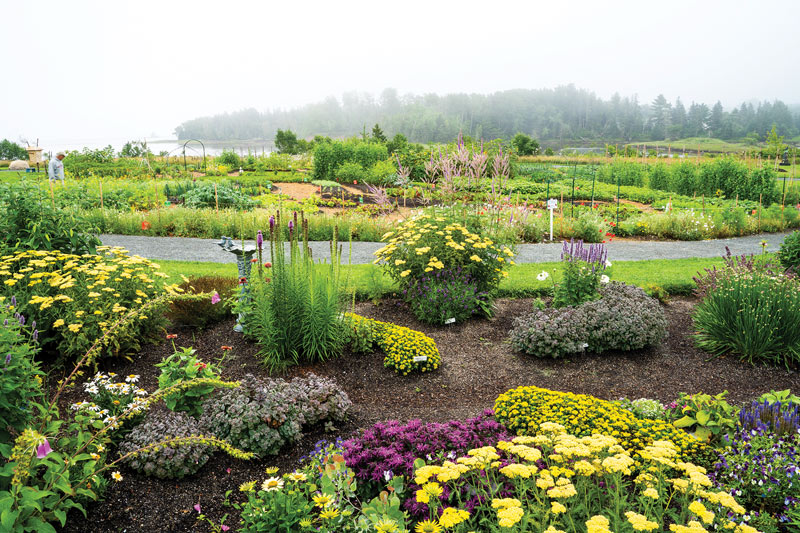
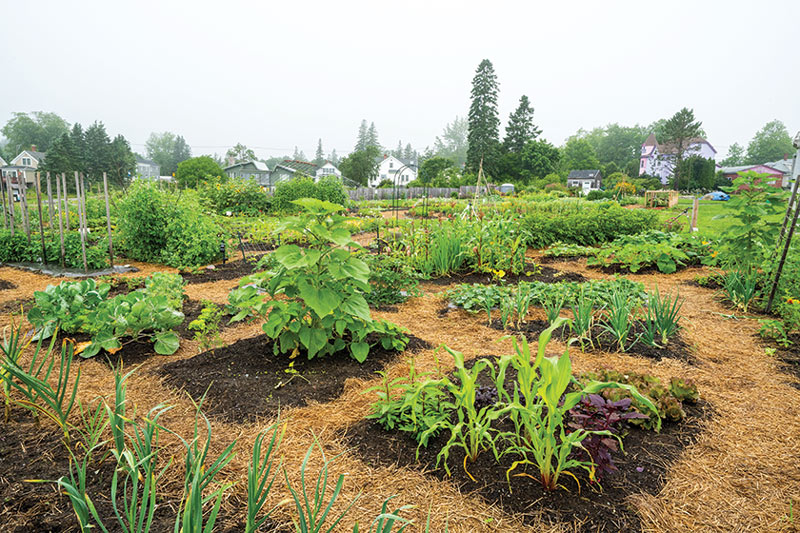
Nurse practitioner Chris Kuhni founded the organization, initially known as the Women’s Health Resource Library, in 2004, providing books and videos to help women in and around Milbridge better navigate conditions like diabetes, menopause, and osteoporosis. The library quickly blossomed into a community center with a wide range of programs, including support groups, toddler playgroups, and Weight Watchers meetings, as well as Bone Builders classes to help older adults reverse the effects of osteoporosis. “We just kept evolving to respond to meet the local needs,” Kuhni says.
Access to nutritious foods quickly emerged as a major need. Washington County has the highest rate of hunger in the state and has among the highest rates of type 2 diabetes, heart disease, and high cholesterol in the nation. “My patients understood that their diets were not good, but they just couldn’t afford healthy food,” Kuhni says. “Many of them were working multiple jobs, and there just weren’t places where they felt comfortable going for a walk.”
The free pick-your-own garden project, called Incredible Edible Milbridge, started with a few planters and then, thanks to land donations and conservation efforts, quickly expanded. Today, 8,000 pounds of organic vegetables are harvested from the 18,000-square-foot plot in Milbridge Commons Wellness Park and a 15,000-square-foot plot at the nearby Red Barn Hotel. Through the gardens and its ever-expanding slate of programs, WHRL reaches more than 4,000 people a year, with just two employees, a 10-member board, and roughly 50 volunteers, including Kuhni, who serves as the unpaid executive director.
From the beginning, WHRL has counted on support from Wyman’s, the Milbridge-based wild-blueberry grower and processor. Over the years, the company has provided essential financial support for the organization, along with contributions of everything from greenhouses to building materials. When WHRL moved into a new headquarters earlier this year, more than 100 Wyman’s employees helped rehab the building as part of a company-wide community-service day called Wildly Better Days. Support for WHRL and other nonprofits, — like the Maine Seacoast Mission, Nature Conservancy, and Maine Community Foundation — is a natural extension of the company’s commitment to sustainability, according to Wyman’s senior director of human resources April Norton.
“One of our greatest resources is our employees, and improving their health and welfare and their rural communities is a large part of that,” Norton says. “WHRL provides critical services to meet so many health needs, and we want to support that however we can.”




